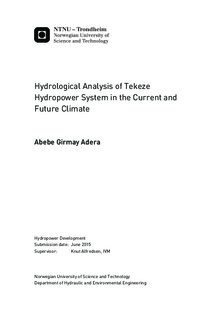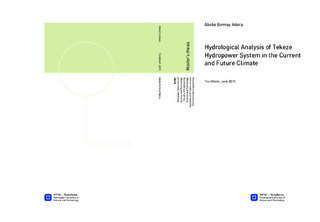| dc.description.abstract | Climate change is expected to intensify the already high hydrological variability and energy production in various regions of the world. This research work investigates the runoff and energy production in the current and future climate for Tekeze hydropower system located in the northern part of Ethiopia. A catchment named Embamadre watershed was delineated and has an area of 44,845km2. The rainfall - runoff model (i.e. HBV) and energy production program (i.e. nMAG) were used to generate runoff and production series for the current situation and future climate. The climate data were downscaled to the target catchment using the CORDEX RCM data for the region from Canadian Center for Climate Modelling and Analysis. The mean monthly change computed from the downscaled climate data in both Rcp45 and Rcp85 scenarios showed an increase of precipitation and temperature for the future time (2041 to 2100). Exceptional results showed by Rcp45 and Rcp85 scenarios that both October and December which are the dry months in Ethiopia will have higher mean monthly rainfall than other months in the future time. Besides, Rcp45 scenario showed that rainfall during the future time (2041 - 2100) in July which is the summer month will decrease. This change was applied to the observed precipitation and temperature data to assess the runoff and energy production series using "delta change approach" and "rainy days" scenario application methods. Since the delta change approach applied the mean monthly change factor without considering the dry days, the second method named "rainy days" was found better. The downscaled RCM data was tested on calibration and direct simulations and found that it will not reproduce the observed results. On the other hand, the energy production for the future time showed an increase in annual energy production. However, this increase is not very high and it was found that the spill during the summer months mainly August and September was very high. As a result using reservoir rule curve as operational strategy which implies making empty the reservoir during the dry period and capturing this spill during the summer period will increase the energy production significantly. To sum up, the climate change will affect the runoff and energy production of Tekeze hydropower. | |

